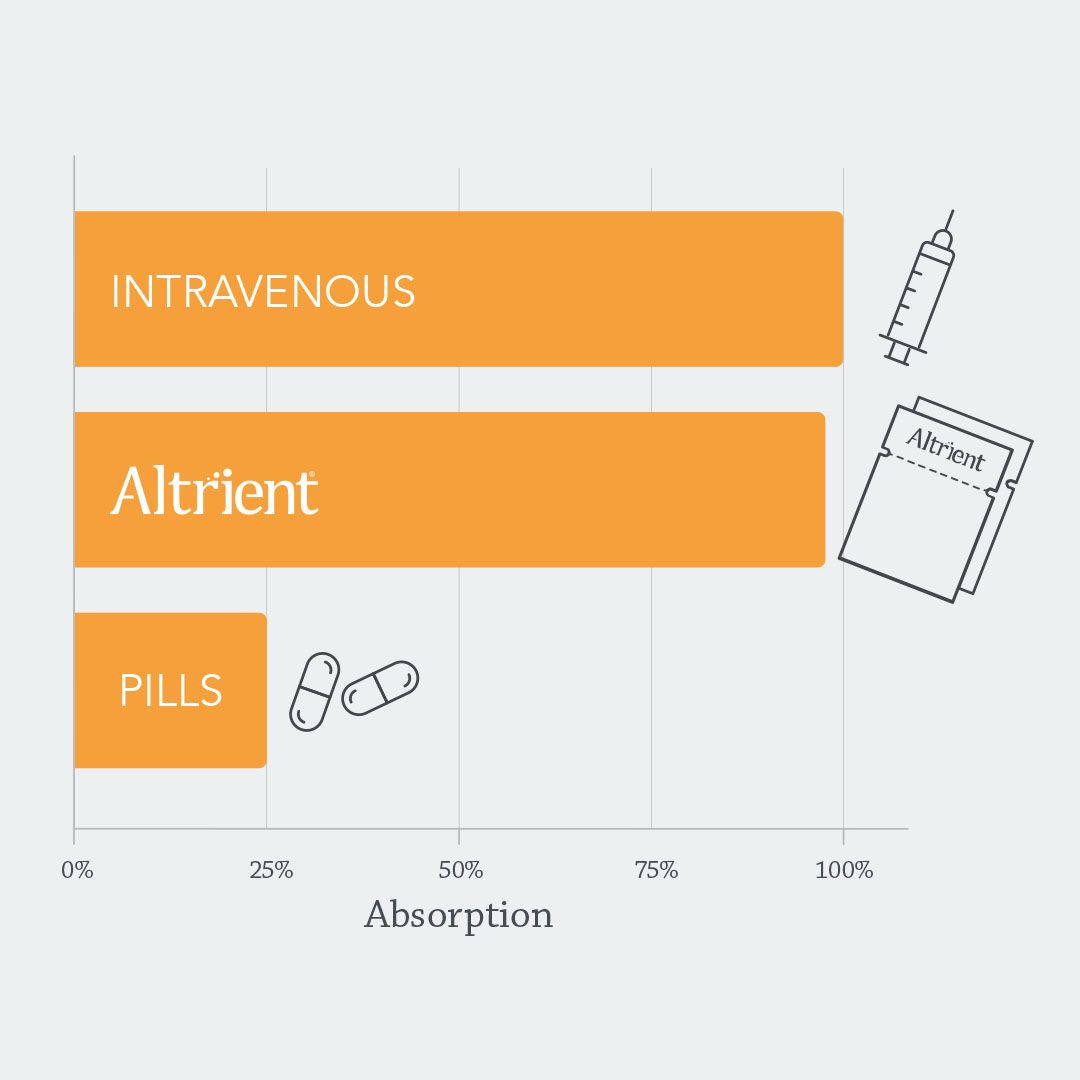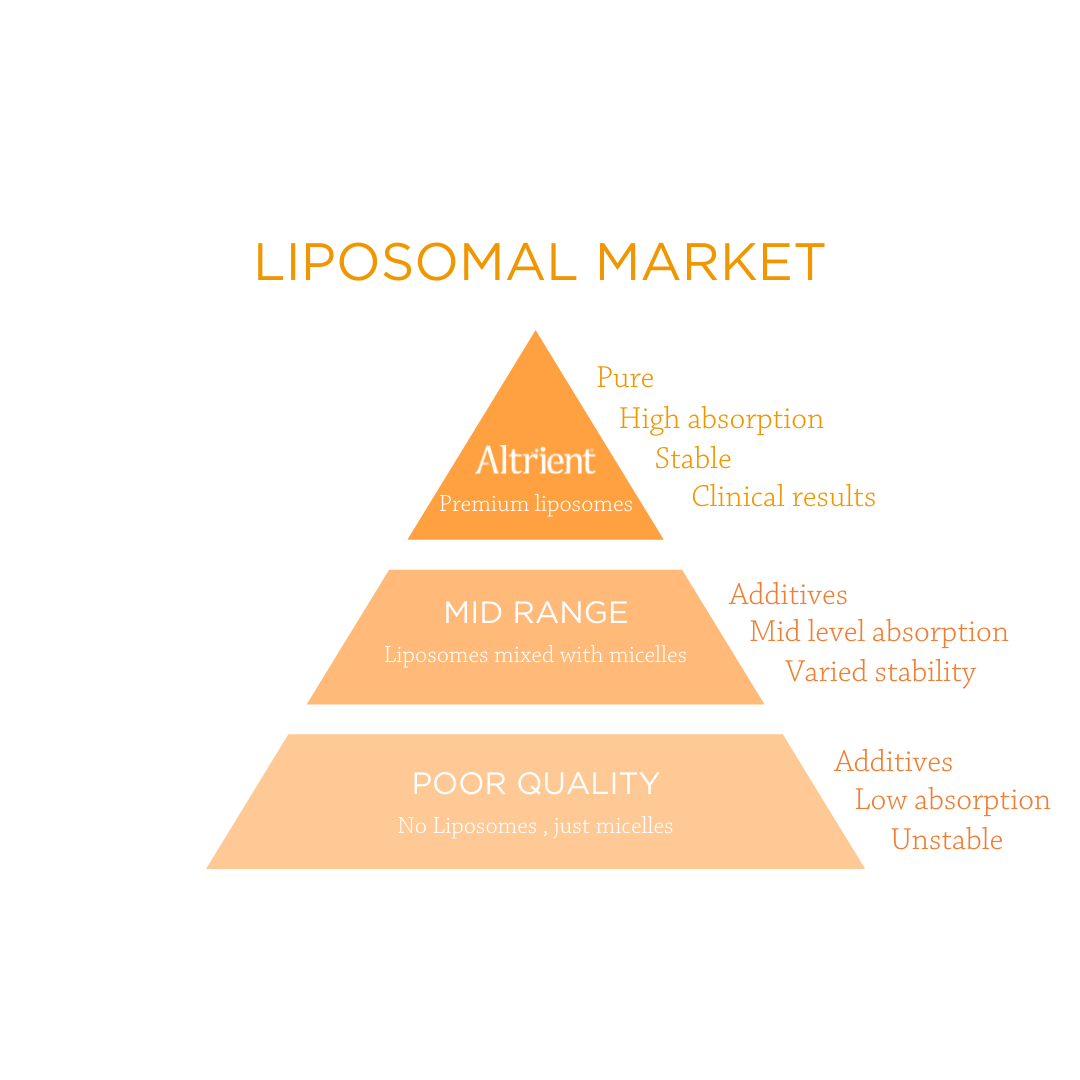Table of Contents
Two years on and a great deal of the population are still struggling to recover from the long-term effects of a globally spread and particularly nasty viral infection. Those who do recover from acute symptoms face lingering problems of various kinds including:
- chronic fatigue
- mental fog
- sleep disturbances
- headaches
- chest tightness
- fever
- hair loss
- rash
- anxiety
- depression
- reduced appetite
- muscle weakness
- muscle pain
- persistent cough
- shortness of breath
- palpitations
- diarrhoea
New discovery for recovery
If you are experiencing any of these symptoms and your long-term health is still unstable following a nasty viral infection, you might be wondering when you’ll ever feel like your true self again. Fortunately, new research from scientists in Italy, shines light on the pivotal role that vitamin C has on post-viral recovery protocols.
Results from a personalised rehabilitation programme run by Dr Matteo Tosato at a clinic in Rome involving lifestyle modifications and the use of combined nutrients indicates that liposomal vitamin C may be one of the key vitamins to help speed up the recovery process.
Defence nutrient toolbox
Medical scientists around the world have launched dozens of research projects in recent months evaluating different nutrients that may be effective for overcoming post viral complications. Vitamin C, amino acids and a range of other defence vitamins and nutrients are being reviewed for their promising therapeutic value.
Based on the evidence gathered from these findings, Dr Tosato and his team have implemented a successful recovery programme in their clinic. The general improvements in symptoms observed using their post-viral protocol have spurred an exciting new trial which is currently underway at the Gemelli Hospital in Rome.
Positive results for liposomal vitamin C
This ongoing clinical trial is sponsored by the University of Milan and involves the use of liposomal vitamin C and L-arginine. Positive results have already been reported after just 30 days, which is great news for those seeking a simple and effective remedy.
5 Hot research topics for vitamin C
Over the last few years vitamin C has sparked interest within the medical community and other researchers are als uncovering new insightful ways in which vitamin C supports the immune system and helps underpin recovery.
The protective role of vitamin C in the management of COVID-19: A Review – this study investigated the value of adding vitamin C to clinical protocols for COVID-19.
High Dose Intravenous Vitamin C for Preventing The Disease Aggravation of Moderate COVID-19 Pneumonia. A Retrospective Propensity Matched Before-After Study this study compared the outcome and clinical course of a group of patients with moderate COVID-19 treated with high dose intravenous vitamin C for one week to a control group. Patients in the two groups were matched in a 1:1 ratio according to age and gender.
Vitamin C supplementation is necessary for patients with coronavirus disease: An ultra-high-performance liquid chromatography-tandem mass spectrometry finding – In this study the vitamin C levels of 31 patients with COVID-19 and 51 healthy volunteers were assessed and an effective dose of vitamin C was calculated.
LISTEN – Flu Fighters Series – Ep 6 – Can Vitamin C in Critical Covid Save Lives?
WATCH – Affordable Vitamin C for Covid | An Interview with Patrick Holford Excellent podcast by world renowned Nutritional Therapist Patrick Holford reviewing the latest vitamin C research.
Vitamin C, a real recovery protocol hero
Medical experts suggest differing reasons for persistent symptoms following on from a serious viral infection. Factors considered to impact recovery include
-
time required for damaged organ systems to recover which varies between individuals.
-
impact of chronic inflammation that occurred during the illness
-
poor immune response and complications related to this
Optimised immune support
One of the most important aspects to combat the long-term impact of a viral infection is to have an optimised immune system. In order for your immune system to function well, it needs a wide range of specific nutrient cofactors, one of which is vitamin C.
This powerful defence nutrient is universally known for its value in human health in particular its contribution to the normal function of the immune system and the protection of cells from oxidative stress.
How healthy cells get damaged
Elevated oxidative stress is a key hallmark of many viral illnesses, often made worse by an overzealous immune response while the body fights off the infection. The consequences of this immune onslaught are high levels of free radicals and cytokines (potent inflammatory protein molecules) which have the potential to damage surrounding healthy cells and tissues.
Preventing and blocking this destructive pathway is a logical and effective strategy for curtailing the damage that sets the scene for chronic post-viral symptoms.
Neutralising problem areas
Some of the latest research has shown that vitamin C acid may be useful for countering oxidative stress and dampening the cytokine storm that often occurs during a serious viral infection2. Researchers believe that levels of vitamin C may be substantially depleted during an active infection since this nutrient is more rapidly utilised3. In light of this it makes perfect sense to increase your vitamin C intake during an infection and supplementing with liposomal vitamin C is a smart option.
Take a breath
Scientific reports also suggest that high doses of vitamin C may support the immune function of those suffering from lung conditions such as acute respiratory distress syndrome and other respiratory illnesses, including sepsis. These immune supportive benefits make liposomal vitamin C a top priority supplement for a nutrition support package.
Why liposomal vitamin C?
To truly benefit from all the therapeutic aspects that vitamin C has to offer, enough vitamin C needs to reach and saturate the cells and tissues. This is why many of the human scientific studies have delivered vitamin C intravenously in order to produce therapeutic benefits. Intravenous vitamin C ensures that high serum concentrations can be reached and maintained for an extended period of time.
The next best thing
While intravenous vitamin injections are available to the rich and famous, the vitamin C available to most of us is found in the foods we eat or the nutrition supplements we take. But not all vitamin C supplements are equal and cardiologist Dr Thomas Levy says that liposomal vitamin C is the closest form of vitamin C to intravenous vitamin C. With liposomal technology it is possible to achieve sufficiently high levels of vitamin C absorption, without the need for intrusive intravenous injections.

Bioactive vitamin C
Liposomal supplements are being used increasingly within the wellness industry to increase the bioactivity of nutrients. The reason they are so effective is because the active ingredients are encapsulated into a double walled lipid structure that surrounds and protects the vitamin C on its journey through the harsh environment of the stomach. Once in the gut the liposome is rapidly absorbed and enters the bloodstream intact, to be circulated around the body and delivered to tissues and cells of the body where it’s needed most.
Choosing a liposomal form of vitamin C for a clinical trial that is evaluating a post viral therapy makes perfect sense. This form of delivery is easy to administer guaranteeing patient compliance, it offers maximised absorption and avoids the gastric discomfort associated with high doses of standard vitamin C supplement containing ascorbic acid.
Authentic liposomes
Good quality, highly absorbable liposomal vitamin C supplements like Altrient C are hard to come by despite the food supplement market being awash with products claiming to be liposomes.
Altrient’ s cutting edge liposomal vitamin C was the world’s first liposomal vitamin C supplement to enter the health food market in 2004. Every Altrient product spends at least two years in research and development, adhering to the highest quality and safety in the industry. The same cannot be said for a great deal of other vitamin C supplements currently being sold under the banner of liposomes.
Altrient’s patented process uses only the finest ingredients to produce, what experts believe to be, the most pure and perfect liposomal vitamin C supplement in the world. You’ll find hard to find a better one

Dr Levy’s “How to” spot a genuine liposome
Dr Thomas Levy, one of the world’s leading experts on vitamin C, reveals how to spot a fake liposomal product, and what to keep an eye out for when shopping for a true liposomal vitamin C supplement.
1. PRICE CHECK
Firstly there’s the cost of the product. If something seems cheap or too good to be true, chances are, it is.
As Dr Levy says: “Altrient and LivOn, when compared to other vitamin C supplements, many think it’s a little bit pricey. That’s because it’s an incredibly involved process to create Altrient, not only to make the liposomes but also to do the quality control and test every batch for purity, liposome size and everything else.”
2. LABEL CHECK
Check the packaging for a reputable manufacturer logo (LivOn) and evidence for rigorous testing standards – you’re looking for certification from NSF, GMP or Informed Sport. Also check for essential ingredients as an indication of pure formulation and for a high level of phospholipids. LivOn – Quality, guaranteed.
3. SIZE CHECK
True liposomal vitamin C liposomes have an average of fewer than 100 nanometers. This meets regulatory requirements, so any higher than that, and the product wouldn’t be industry standard.
4. SOLUBILITY CHECK
Liposomal products don’t dissolve in water and cannot be blended or mixed with hot drinks.
References
-
Raveendran AV, Jayadevan R, Sashidharan S. Long COVID: An overview. Diabetes Metab Syndr. 2021;15(3):869-875. doi:10.1016/j.dsx.2021.04.007.
-
Boretti A and Banik BK. Intravenous vitamin C for reduction of cytokines storm in acute respiratory distress syndrome. PharmaNutrition. 2020 Jun; 12: 100190.Published online 2020 Apr 21. doi: 10.1016/j.phanu.2020.100190.
-
Gregory Patterson,Carlos M. Isales,Sadanand Fulzele. Low level of Vitamin C and dysregulation of Vitamin C transporter might be involved in the severity of COVID-19 Infection[J]. Aging and disease, www.aginganddisease.org/EN/10.14336/AD.2020.0918.
-
Miranda-Massari JR, Toro AP, Loh D, Rodriguez JR, Borges RM, Marcial-Vega V, Olalde J, Berdiel MJ, Riordan NH, Martinez JM, Gil A, Gonzalez MJ. The Effects of Vitamin C on the Multiple Pathophysiological Stages of COVID-19. Life (Basel). 2021 Dec 3;11(12):1341. doi: 10.3390/life11121341. PMID: 34947872; PMCID: PMC8708699.
-
Candida J. Rebello, Christopher L. Axelrod, Charles F. Reynolds, Frank L. Greenway, John P. Kirwan. Exercise as a Moderator of Persistent Neuroendocrine Symptoms of COVID-19. Exercise and Sport Sciences Reviews, 2022; Publish Ahead of Print DOI: 10.1249/JES.0000000000000284.
Other reading resources
https://www.abundanceandhealth.co.uk/en/blog/post/1634-buyer-beware-how-to-tell-when-a-product-is-not-liposomal
https://www.abundanceandhealth.co.uk/en/cms/23-the-ultimate-guide-to-vitamin-c
https://www.abundanceandhealth.co.uk/en/cms/29-the-ultimate-guide-to-liposomal-encapsulation-technology
-
http://orthomolecular.org/resources/omns/v18n03.shtml





More Stories
Do you LOVE your dermatologist? Importance of Providers You Can Trust
Changing how Black Americans use life insurance could help shrink the racial wealth gap [Video]
Digital Innovation Spurs Seamless Healthcare Engagement